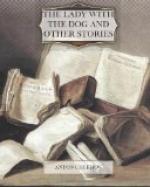“If I know I am mentally affected, can I trust myself?”
“And are you sure that the men of genius, whom all men trust, did not see phantoms, too? The learned say now that genius is allied to madness. My friend, healthy and normal people are only the common herd. Reflections upon the neurasthenia of the age, nervous exhaustion and degeneracy, et cetera, can only seriously agitate those who place the object of life in the present—that is, the common herd.”
“The Romans used to say: Mens sana in corpore sano.”
“Not everything the Greeks and the Romans said is true. Exaltation, enthusiasm, ecstasy—all that distinguishes prophets, poets, martyrs for the idea, from the common folk—is repellent to the animal side of man—that is, his physical health. I repeat, if you want to be healthy and normal, go to the common herd.”
“Strange that you repeat what often comes into my mind,” said Kovrin. “It is as though you had seen and overheard my secret thoughts. But don’t let us talk about me. What do you mean by ’eternal truth’?”
The monk did not answer. Kovrin looked at him and could not distinguish his face. His features grew blurred and misty. Then the monk’s head and arms disappeared; his body seemed merged into the seat and the evening twilight, and he vanished altogether.
“The hallucination is over,” said Kovrin; and he laughed. “It’s a pity.”
He went back to the house, light-hearted and happy. The little the monk had said to him had flattered, not his vanity, but his whole soul, his whole being. To be one of the chosen, to serve eternal truth, to stand in the ranks of those who could make mankind worthy of the kingdom of God some thousands of years sooner—that is, to free men from some thousands of years of unnecessary struggle, sin, and suffering; to sacrifice to the idea everything—youth, strength, health; to be ready to die for the common weal—what an exalted, what a happy lot! He recalled his past—pure, chaste, laborious; he remembered what he had learned himself and what he had taught to others, and decided that there was no exaggeration in the monk’s words.
Tanya came to meet him in the park: she was by now wearing a different dress.
“Are you here?” she said. “And we have been looking and looking for you. . . . But what is the matter with you?” she asked in wonder, glancing at his radiant, ecstatic face and eyes full of tears. “How strange you are, Andryusha!”
“I am pleased, Tanya,” said Kovrin, laying his hand on her shoulders. “I am more than pleased: I am happy. Tanya, darling Tanya, you are an extraordinary, nice creature. Dear Tanya, I am so glad, I am so glad!”
He kissed both her hands ardently, and went on:
“I have just passed through an exalted, wonderful, unearthly moment. But I can’t tell you all about it or you would call me mad and not believe me. Let us talk of you. Dear, delightful Tanya! I love you, and am used to loving you. To have you near me, to meet you a dozen times a day, has become a necessity of my existence; I don’t know how I shall get on without you when I go back home.”




